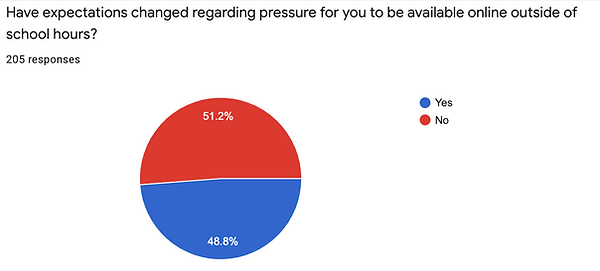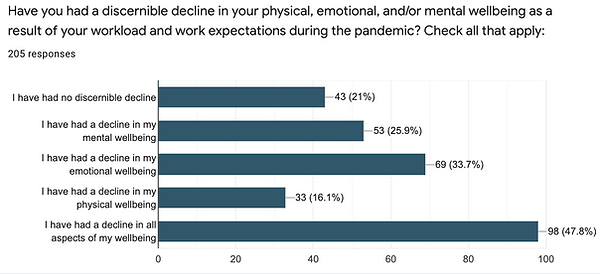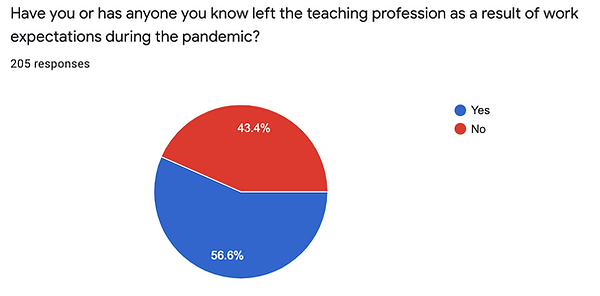Moving Forward — Where Can Bridges Be Built?
The ebb and flow of teacher support throughout the pandemic has certainly shed light on the work needed to rebuild trust and confidence in public school educators. Regardless of whether teachers deserve the public persona they hold, the truth remains that there are hugely influential powers working to squash K-12 solidarity.
So, what can be done in Massachusetts? The pandemic has put in motion a number of opportunities, the most promising being capitalizing on MCAS cancelation support.
Despite what the Boston Globe Editorial Board surmises, the Commonwealth has made it clear where they stand with high-stakes testing. According to a recent poll conducted by Echo Cove consulting for MTA, seventy percent of the 600 Massachusetts residents ages 18 and older who took the poll supported canceling the MCAS this past spring:
In addition to testing, the MTA poll shed light on overall sentiment toward public educators, the work they’re doing, and where the public would like to see financial and emotional investments in education. The results were incredibly promising —The poll suggests “Massachusetts residents are deeply appreciative of the role that educators have played during the COVID-19 pandemic, both in terms of their teaching efforts and in fighting for the health and safety of students, their families, and their communities.” The data shows: 76% of participants approve of how public school teachers/educators have responded to the pandemic; 63% believe that educators' jobs have been harder during the pandemic; and 52% have a more favorable view of educators than before the pandemic (MassTeacher.org).
What’s even more promising is where the public would like to see public education in Massachusetts go. Overwhelmingly, participants agreed public schools should not return to the “old normal” after the pandemic, instead believing that changes must be made to help students recover emotionally, socially, and academically. Alongside this, data showed “focus on the ‘whole child’ should extend beyond simply helping students cope with the pandemic...two-thirds of those surveyed believe that we should take this opportunity to reimagine our school system.”
Separate from this MTA poll, I conducted a survey completed by more than 200 MTA teachers as an opportunity for them to relay their personal pandemic experiences. Despite MTA’s poll participants claiming to overwhelmingly approve of teacher response to COVID-19, teacher respondents to my poll expressed feeling deeply unsupported, burnt out, and fearful for their health and safety.
According to the data, nearly half of respondents felt their expectations to be available outside of school hours changed:
98% of respondents said they worked at least 1-5 hours outside of their typical work day, with nearly 40% saying they were putting in more than 10 extra hours a week.
When it came to their health, nearly half (47.8%) of respondents said they had a decline in all aspects of their wellbeing (mental, emotional, and physical) as a result of their pandemic workloads:
Due to the stress and burnout of the pandemic, 56% of respondents either knew a colleague who left the teaching profession or quit their job.
And a staggering 84% of respondents did not have a chance to become fully vaccinated before returning to in-person learning:
Looking at these two polls side by side, what can we conclude? If the public overwhelmingly felt satisfied with teacher performance this past year, and teachers clearly outdid themselves for the betterment of their students, this moment is a perfect opportunity to get the public back in solidarity with unionized educators.
Knowing respondents are highly in favor of focusing on the whole child and open to exploring new possibilities for the future of public schools, MTA should take advantage of this moment. Now is the time to create robust campaigns surrounding what public educators want in comparison to the reality of what the loudest proponents of charters, vouchers, and school choice actually hope to achieve — a privatized, gutted curriculum with the sole intention of lining the pockets of venture capitalists.
When asked, “What are the most important outcomes, for you, as far as student success is concerned during the pandemic and beyond?” in my poll, the answers of teachers largely reflected those of parent respondents in MTA’s survey:
-
Keeping them engaged and healthy
-
Social emotional well-being
-
My goal has been connection. I’ve done extensive writing exercises, no tests or quizzes, just reading, discussing, writing. I want them to trust and find their own voices. Pushing back against a district demanding “evidence” of skills acquisition.
-
Students feel safe and loved.
-
Allowing students to feel comfortable emotionally, being there for them as a support. Even though everyone is putting pressure on having them make major progress, I am happy about ANY progress.
-
Students should feel proud of themselves and their personal and academic progress
-
I want them to continue academic growth while I also try to foster continuing emotional connection between myself and students and students and students.
-
Self-actualization, autonomy, emotional and physical well-being
-
I hope they don't hate learning.
-
That students are learning meaningful content and growing as people, feeling good about themselves and others.
-
That students don’t feel like they’re “behind.” There is no “behind” right now in the curriculum when we’re in a worldwide pandemic. That idea is archaic and puts WAY too much pressure on students.
As the data shows, so many of the basic wants and needs of parents are overwhelmingly supported by unionized educators themselves: no more standardized testing; smaller classroom sizes; expanded enrichment and extra-curricular programming; expanded recess and time spent outside the classroom; and less homework. If MTA can build upon this marked sentiment shift and illustrate how these ideas are only feasible when everyone works in solidarity, rather than rely on the benevolence of venture capitalists and their education reform, the state and its teachers can reinvent the future of public schools for the common good — and create a truly holistic model for education.







